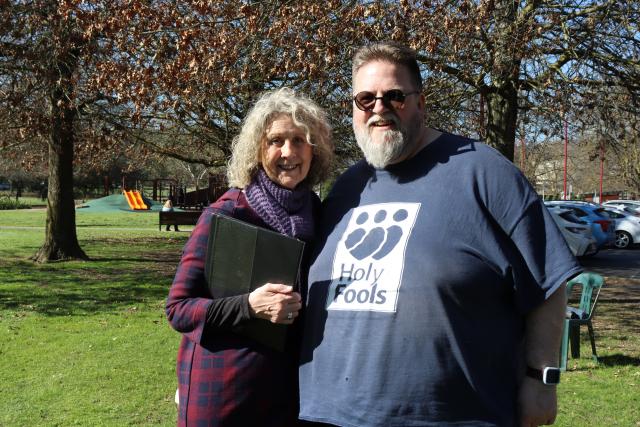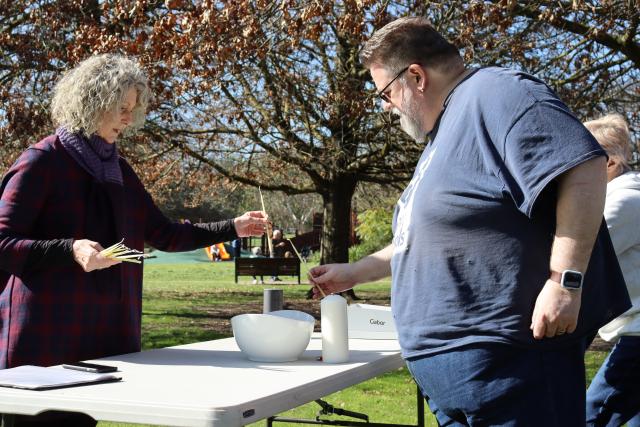
By Mikayla van Loon
The effects of homelessness can have devastating impacts particularly on people sleeping rough and in some cases results in avoidable deaths.
In an effort to remember the lives of those who have been taken too soon from living without a roof over their heads, Holy Fools founder and CEO Neal Taylor, alongside celebrant Jenny Keddell began holding a memorial service in their honour.
Since 2018, minus the years of the pandemic, Mr Taylor and Ms Keddell have met in Melba Park during Homelessness Week to light a candle and say a few words about the people who have died from homelessness.
On Tuesday 8 August a small group of people met and did just that.
“The main purpose of today’s memorial service is to honour and remember those amongst us who lived, loved, laughed, cried, worked, played and died homeless,” Ms Keddell said.
“Those people we have befriended, loved, admired, been helped by in a myriad of ways. May they now be free, strong, proud of who they have been knowing that they are being mourned and missed.”
Ms Keddell said the memorial is also about acknowledging that as a community “we have the ability to impact the lives of others”.
“We all breathe the same air, we walk the same streets. We all deserve to be treated with dignity and respect,” she said.
“Too many people have died too soon because they did not have a place to call home.”
For Mr Taylor, he has encountered numerous rough sleepers during his time running the outreach support at Holy Fools, meaning he knows many people who have died from its effects.
“I can see faces more than I can remember some of the names. There’s about a dozen guys over 15 years [who have died] not all from being homeless,” he said.
One man Mr Taylor can recall who was a heroin addict who eventually got himself clean, ended up
“He went to prison, got cleaned up, came out and was doing really well. He hung out at a friend’s house, overdosed and died,” he said.
“So while he wasn’t homeless, he was one of the crowd of the guys that we worked with, just some of them are really silly, preventable deaths.”
Another man who had an addiction to alcohol and ended up stealing methylated spirits from the supermarket which landed him in hospital, Mr Taylor said was a particularly sad story.
“He was discharged quite healthy. He stayed with one of our volunteers and was doing really well for himself but secretly he had started back on the booze and he died underneath the Alexandra Public Hall after consuming two bottles of vodka.
“It was the middle of winter so he either died from hypothermia or from overdose of alcohol.
“He had a family with kids but alcohol was his issue, where he would stay on the street because it was easier to drink alcohol.
“His funeral was particularly sad because the family were there, remembering him. He was a good guy and he was always concerned about other people.”
Anchor Rapid Response senior worker Talia Appleby said unfortunately for many people sleeping rough, the choice comes down to their addiction or having a home.
“Some of our rough sleepers choose that because the rooming houses aren’t great around here,” she said.
“But also, some people will choose their addiction, it could be gambling, drugs, alcohol, even smoking now, over accommodation because rooming houses are $260 a week.”
Even if a person enters living on the streets without an addiction, Ms Appleby said it is more likely they will end up with one because of the conditions, especially for women.
“A lot of the women we work with who are rough sleeping, they’ll use alcohol or some kind of stimulant drug overnight to keep them awake for safety. They’ll sleep during the day because it’s safer.
“It’s unsafe for men as well but there’s obviously an extra element with women rough sleeping. So a lot of people who didn’t have a drug or alcohol problem beforehand do tend to develop one because it’s just keeping yourself safe.”
Mr Taylor said even if some of these people wanted to seek help, sometimes just finding the right service or support can be a challenge.
“When you become homeless, you don’t know what to do. There’s no ABC on how to be homeless and people are finding it tough once they become homeless or when a set of circumstances happen on what they need to do to help themselves,” he said.
Ms Appleby said it’s in those instances that a drop in centre in Lilydale or elsewhere in the Yarra Ranges could make a huge difference.
“[A place] where people can actually go and so it’s a community, it’s a belonging place. We’re never going to be able to take away the drugs and alcohol, that’s not our role to do,” she said.
“There’s obviously a reason they use and and choose to do that but by creating community and a sense of family for them it gives them more opportunity to see in themselves ‘Oh, maybe I don’t need to do it this way’.”
Ms Keddell said for these people who enter rough sleeping, “there’s a big difference between being alone and lonely”.
“Homeless does not mean nameless and homeless does not mean roofless. A home is more than a physical structure. It is a place where individuals or families find a sense of belonging, safety, comfort, and identity,” she said.
Ms Appleby said taking the stigma and stereotype out of being homeless would perhaps prevent more people slipping into that experience because they might be more comfortable in asking for help.
That also stems into ensuring the support and skills begin at a young age so when they become adults they don’t fall into those experiences of homelessness.
“We all make questionable choices but a lot of us are lucky enough to have support, to have somebody there, it only takes one person or to be given the skills to support yourself during your adolescence,” she said.
“Growing up, a lot of the people we work with I don’t think ever got the chance to develop those skills and some people don’t have anybody to rely on and I think that’s a big difference.”







